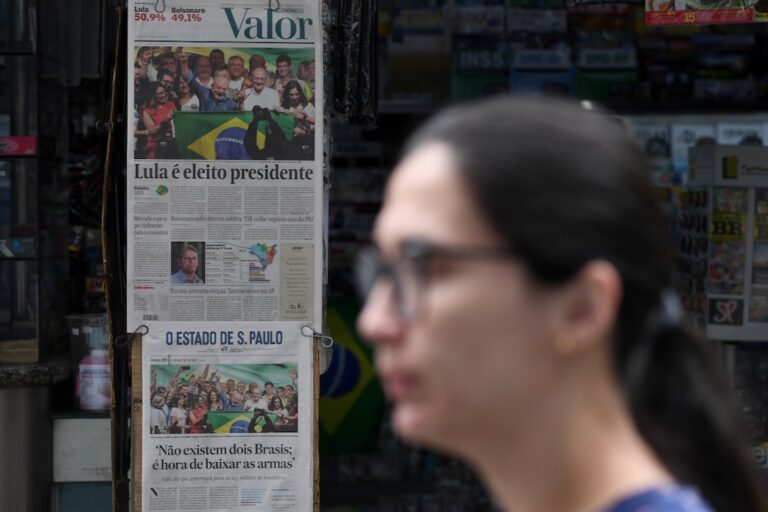(IAPA/IFEX) – The following is a 27 July 2006 IAPA press release: IAPA welcomes Brazil president’s veto of anti-press legislation MIAMI, Florida (July 27, 2006) – The Inter American Press Association (IAPA) today welcomed a decision by Brazil’s President Luiz Inácio Lula da Silva to veto a bill that sought to extend the legal requirement […]
(IAPA/IFEX) – The following is a 27 July 2006 IAPA press release:
IAPA welcomes Brazil president’s veto of anti-press legislation
MIAMI, Florida (July 27, 2006) – The Inter American Press Association (IAPA) today welcomed a decision by Brazil’s President Luiz Inácio Lula da Silva to veto a bill that sought to extend the legal requirement of a university degree in order to work as a journalist. The organization said it hoped the Brazilian Federal Congress would now ratify the presidential veto.
Complementary Legislative Bill 79/04 sought to increase from 11 to 23 the number of jobs in the press that could be done only by university graduates. Among the additional categories would have been commentators, photographers, layout artists, illustrators, proofreaders and professors of journalism.
The Brazilian president vetoed the bill, which had been passed by Congress on July 4, yesterday. Since then, a working group made up of government representatives and media executives and staff members was named and asked to report back within 120 days with a proposal for a new bill.
The original measure was opposed by numerous news organizations, which saw it as a restriction of press freedom that would further hinder journalistic activity.
In a letter to President Lula da Silva, IAPA President Diana Daniels and the chairman of the IAPA’s Committee on Freedom of the Press and Information, Gonzalo Marroquín, expressed their organization’s hope that now the Federal Congress, “rather than revising or improving the legislation in question, will adhere to the spirit of the American Convention on Human Rights and repeal any requirement that limits press activity.” This echoed a call that the IAPA has been making in all those countries of the Western Hemisphere with a legal requirement that you must have a university degree or belong to a union or other association to work as a journalist.
Following is the full text of the letter:
“The Inter American Press Association (IAPA), representing more than 1,300 print publications in the Americas, wishes to express its satisfaction at the veto of Complementary Legislative Bill 79/04 which, had it been enacted, would have increased even further the restrictions on journalistic activity that existed in your country in requiring people to have a university degree in order to carry out other tasks or duties connected with the profession.
“For decades now our organization has been battling in the Western Hemisphere for the elimination of any prior requirement to work as a journalist, such as obligatory membership in an association or the possession of a university degree. Indeed, in a 1985 Advisory Opinion the Inter-American Court of Human Rights declared obligatory membership in a professional association or the requirement of a university degree to be incompatible with the American Convention on Human Rights and a violation of human rights, among them freedom of expression.
“That is why the IAPA recently joined the calls in this regard made by a number of Brazilian associations, among them the National Newspaper Association (ANJ), the National Association of Magazine Publishers (ANER), the Brazilian Association of Radio and Television Companies (ABERT), and the Brazilian Press Association (ABI).
“Mr. President, in light of the above the IAPA is delighted that you have reacted in time to not enact a law that would open up a whole range of new restrictions and that you stand behind the spirit of the Declaration of Chapultepec, which you signed in May 3 this year, and the Declaration of Principles of Freedom of Expression, which states that ‘obligatory membership in associations or the requirement of a university degree in order to work as a journalist amount to an unlawful restriction of freedom of expression.’
“We now place our trust in the Federal Congress that, rather than revising or improving the legislation in question, there will prevail the spirit of the American Convention on Human Rights, and any mandatory requirement limiting journalistic activity will be repealed.”


